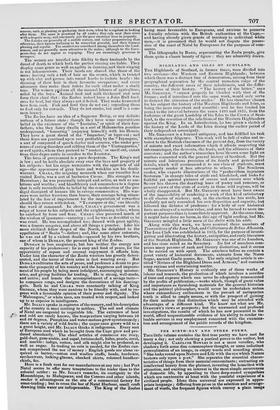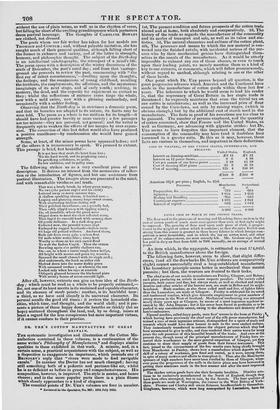THE BIRTH-DAY AND OTHER POEMS.
THIS little volume contains the first true poetry we have met for many a day; not only showing a poetical power in the author, but developing it. CAROLINE BOWLES is not a mere versifier, who shadows forth some dim commonplace thought, or some indistinct generalization of an image, in empty words and sounding strain. " She looks round upon Nature and Life with the eye which Nature bestows only upon a poet." She separates the essential charac- teristics of things from their material concomitants; extracting an intellectual beauty from the plainest, investing the homeliest with attraction, and exciting an interest in the most simple occurrences of domestic life, by appealing to those deep-rooted sympathies which are coextensive at least with the youthful experience of a civilized people. Ideas thus universal are expressed in appro- priate language ; differing from prose in the selection and arrange- ment of words, the frequent figures which convey a plain image *without the use of plain terms, as well as in the rhythm of verse, but falling far short of the swelling grandiloquence which poetasters deem poetical language. The thoughts of CAROLINE BOWLES are clothed, not dressed.
The poets whom our fair writer has taken for her models are THOMSON and Cowes's ; and, without palpable imitation, she has caught much of their general qualities, although falling short of the former in richness and variety, and of the latter in strength, humour, and philosophic thought. The subject of the Birth-day is an intellectual autobiography, the retrospect of a mind's life. The poem opens with a description of the wintry dreariness of the sixth of December, the poet's natal day ; and from that 'vantage- ground she proceeds to review the past, commencing with "the first ray of infant consciousness,"—dwelling upon the thoughts, the feelings, and the companions of young childhood, recalling the incidents, the employments, the affections, and the mysterious imaginings of its next stage, and of early youth ; reviving, in memory, the dead, and the capacity for enjoyment as extinct as they; whilst the reflections of matures years tinge the whole, now with a mild satire, now with a pleasing melancholy, and occasionally with a sadder feeling. Observing that the Birth-day is in strictness a domestic poem, and that its beauties are adapted to its nature, its faults may be soon told. The poem as a whole is too uniform for its length—it should have had greater brevity or more variety ; a few passages are too minute—they are personal, not general; and the writer is frequently apt to weaken the effects of her images by overexpan- sion. The correction of this last defect would also have produced a positive excellence—by condensation she would have gained strength. Some, at least, of the minor poems have appeared before; and of the others it is unnecessary to speak. We proceed to extract. This passage is brief, but beautiful— It is not love that steals the heart from love ; 'Tis the hard world, and its perplexing cares ; Its petrifying selfishness, its pride,
Its low ambition, and its paltry aims.
The following strikes us as a very excellent piece of pure description. It derives no interest from the accessories of reflec- tion or the introduction of figures, and but one assistance from poetical illustration. The images alone are presented to the mind, and with remarkable vividness and truth.
That was a lovely brook, by whose green marge, We two (the patient angler and his child) Loitered away so many summer days.
A shallow sparkling stream, it hurried now— Leaping and glancing among large round stones, With everlasting friction chafing still Their polished smoothness—on a gravelly bed, Then softly slipp'd away with rippling sound ; Or, all inaudible, where the green moss Sloped down to meet the clear reflected wave, That lipp'd its emerald bank with seeming show Of gentle dalliance. In a dark deep pool Collected now, the peaceful waters slept Embayed by rugged headlands—hollow roots Of huge old pollard willows. Anchored there, Rode safe from every gale, a sylvan fleet Of milk-white water-lilies ; every bark Worthy as those on his own sacred flood To waft the Indian Cupid. Then the stream Brawling again o'er pebbly shallows ran, On—on, to where a rustic rough-hewn bridge, All bright with mosses and green ivy wreaths, Spanned the small channel with its single arch ; And underneath, the bank on either side Shelved down into the water darkly green With unsunned verdure ; or whereon the sun Looked only when his rays at eventide Obliquely glanced between the blackened piers With arrowy beams of orient emerald light.
After all, however, extracts can give no true idea of the Birth- day; which must be read as a whole to be properly estimated,— for, not one of its least merits is its sustained and equable character, and its absence of made points : another, is its healthful tone: a third, as we have said already is its universal character. Its perusal recalls the good old times : it revives the household cha- rities, which time, and thought, and the world chill ; and it pre- sents a picture of those happy domestic hearths so thickly (let us hope) scattered throughout the land, and, by so doing, raises at least a regard for the less conspicuous but more important virtues, if it cannot conduce to their practice.



























 Previous page
Previous page